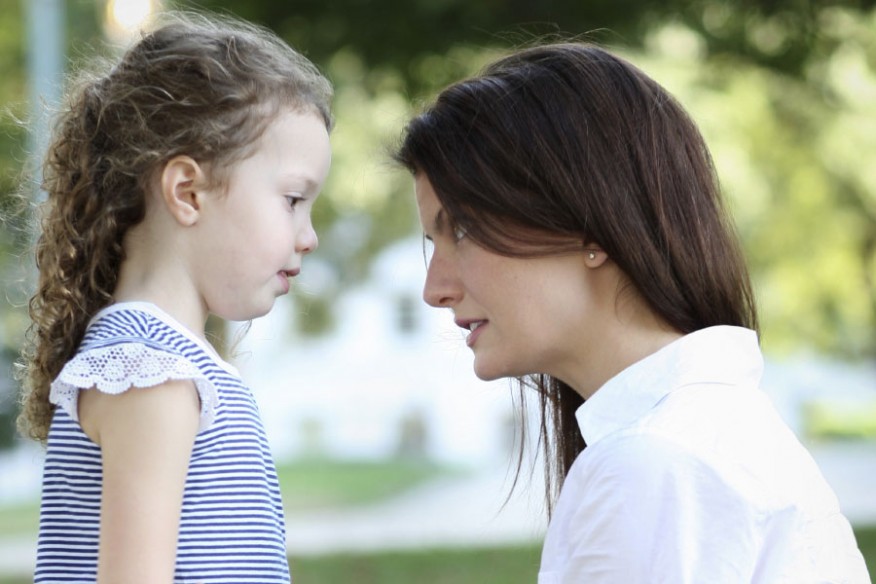Andrew Grogan-Kaylor from the University of Michigan, and Elizabeth Gershoff from the University of Texas, conducted a meta-analysis of over 50 years worth of studies on the issue of corporal punishment that included more than 160,000 children. Spanking was found to be associated with a number of undesirable outcomes.
When children are spanked by their parents, the risk of developing aggression, anxiety or mental health problems is higher than for children who are not spanked. With that knowledge, why is this common form of punishment still used in modern society?
As human beings, we often tend to be bad at seeing long-term outcomes.
“Parents spank because they want to correct bad behavior that’s happening right now,” Grogan-Kaylor said. “As human beings, we often tend to be bad at seeing long-term outcomes. So what the research says is that the spanking is probably not going to correct the behavior in the short-term and it’s very likely to lead to mental health difficulties, anxious kids, aggressive kids over the longer term.” Parents use spanking to correct problems short-term but do not consider long-term issues that could come from their actions. Growing up in such an environment, children could potentially become more aggressive adults to resolve their conflicts as they were taught by their parents. Children who are spanked are also more likely to use spanking with their own children if they become parents.
Spanking and Child Outcomes: Old Controversies and New Meta-Analyses brings the long-term effects of spanking to mind and causes the reader to rethink the way that they punish their children. While many parents think that spanking their children with just cause is unrelated to abuse, Gershoff and Grogan-Kaylor believe otherwise: "Spanking was also significantly associated with lower moral internalization, lower cognitive ability, and lower self-esteem.” Gershoff and Grogan-Kaylor also compared the outcomes of spanking with outcomes of abuse. In terms of outcomes, the outcomes of spanking and of abuse are very similar, with the effects of spanking often being about 2/3 the size of the effects of abuse.
By comparing spanking to abuse, Grogan-Kaylor and Gershoff force parents to think harder about why hitting their child when they are misbehaving is any more useful than hitting their child for no reason at all and causes them to think about how it could be threatening their child’s future.
Media Coverage for Grogan-Kaylor’s Research:
ABC News. “New Report Says Spanking May Be Linked to Lifelong Social, Mental Health Problems in Kids”.
http://abcnews.go.com/GMA/video/study-spanking-linked-lifelong-social-mental-health-problems-38723342
American Psychological Association. “The Case Against Spanking”.
http://www.apa.org/monitor/2012/04/spanking.aspx
CBSNews. “5-Decade Study Reveals Fallout from Spanking Kids”.
http://www.cbsnews.com/news/5-decade-study-reveals-fallout-from-spanking-kids/
Click On Detroit. “Spanking does more harm than good, study says”.
https://www.clickondetroit.com/lifestyle/2016/04/25/spanking-does-more-harm-than-good-study-says/
CNN En Español. “Por qué nunca deberías castigar a tus hijos dándoles palmadas.”
http://cnnespanol.cnn.com/2016/04/26/por-que-nunca-deberias-castigar-a-tus-hijos-dandoles-palmadas/#0
Daily Mail. “Smacking Children ‘Does More Harm than Good’ and Leads to Mental Problems and Worse Behaviour”
http://www.dailymail.co.uk/health/article-3561153/Smacking-children-does-harm-good-leads-mental-health-problems-worse-behaviour.html
Le Monde。fr。 ”La France est-elle prête à interdire la fessée ?“
http://www.lemonde.fr/societe/article/2016/04/30/la-france-est-elle-prete-a-interdire-la-fessee_4911258_3224.html
Michigan Radio. “Spanking does more harm than good, says new U of M study”.
http://michiganradio.org/post/spanking-does-more-harm-good-says-new-u-m-study#stream/0
The Atlantic. “The Strong Evidence Against Spanking”.
http://www.theatlantic.com/health/archive/2016/04/the-strong-evidence-against-spanking/479937/
The Conversation。 “Hard Evidence:Spanking Could Lead to Health Problems, Antisocial Behaviour”.
http://theconversation.com/hard-evidence-spanking-could-lead-to-health-problems-antisocial-behavior-58566
The Michigan Daily. “University Study Finds Spanking Harmful for Children”.
https://www.michigandaily.com/news/university-research-finds-spanking-does-more-harm-good-children/
The Telegraph. “Why you should never spank a child- major research confirms dangers”.
http://www.telegraph.co.uk/science/2016/04/26/why-you-should-never-spank-a-child---major-research-project-conf/
The Washington Post. “Video of Georgia School Paddling Puts Spotlight on Corporal Punishment”.
https://www.washingtonpost.com/national/video-of-georgia-school-paddling-puts-spotlight-on-corporal-punishment/2016/04/30/11cabc96-0ef3-11e6-8ab8-9ad050f76d7d_story.html
TVNZ. “When I’ve been tempted to smack my kids is not their naughtiest but when I’m exhausted”. WebMD. “Spanking Linked to Long-Term Mental Health Issues”.
http://www.webmd.com/parenting/news/20120702/spanking-linked-long-term-mental-health-issues
WEMU 89.1. “Decades of Study Show that Spanking Does More Harm than Good”.
http://wemu.org/post/decades-study-say-spanking-does-more-harm-good#stream/
WXYZ Detroit. “Spanking children does more harm than go0d, University of Michigan Researchers Say”.
http://www.wxyz.com/news/region/washtenaw-county/spanking-children-does-more-harm-than-good-university-of-michigan-researchers-say
Yahoo News. “Here’s What Getting Spanked as a Kid Did to Your Personality, According to Science”.
https://www.yahoo.com/beauty/heres-getting-spanked-kid-did-170100836.html
20 Minuten. “Schon ein gelegentlicher Klaps schadet Kindern”.
http://www.20min.ch/wissen/news/story/Schon-eingelegentlicher-Klaps-schadet-Kindern-11174120
